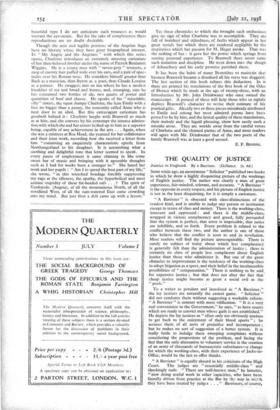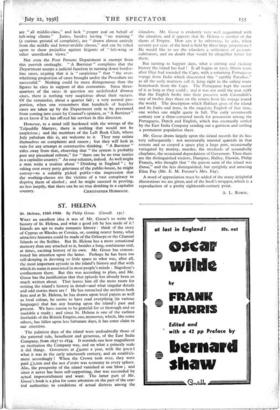THE QUALITY OF JUSTICE
Justice in England. By a Barrister. (Gollancz. 7s. 6d.)
SOME while ago, an anonymous " Solicitor " published two books in which he drew a highly disquieting picture of the workings of English justice. The author was dearly a man of great experience, fair-minded, tolerant, and accurate. " A Barrister " is the opposite in every respect, and his picture of English justice is not in the least disquieting, for it is simply a caricature.
" A Barrister " is obsessed with class-distinctions of the crudest kind, and is unable to judge any person or' institution except in terms of class and mousey. There is the working-class, innocent and oppressed : and there is the middle-class, wrapped in vicious complacency and greed, fully persuaded that the systeth is perfect, that error is impossible, that juries are infallible, and so forth. Every problem is related to the conflict between these two, and the author is one of those who believe that the conflict is soon to end in revolution. Most readers will find the picture unrecognisable. There is surely no subject of today about which less complacency is generally felt than the administration of justice ; there is certainly no class of people less complacent about English justice than those who administer it. But one of the great obstacles to improvement is the tendency of the working-class to adopt litigation as a sport, and their belief in the inexhaustible possibilities of " compensation." There is nothing to be said. foi expensive justice ; but that does not alter the fact that cheap justice might become as great a social evil as the " pools."
To a writer as petulant and jaundiced as " A Barrister," the lay justices are naturally the easiest game. " Solicitor " did not cOndemn them without suggesting a workable reforin. " A Barrister " is content with mere vilification. " It is a very real convenience to the GoVernment," he says, " to have courts which are ready to convict men whose guilt is not established." He depicts the lay justices as " often only too obViously anxious to get back to the enjoyment Of their blood sports " ; he accuses *then of all sorts of prejudice and incompetence ; but he makes no sort of suggestion of a better syitem. rt is really futile to indulge these sweeping complaints without considering the proportions of the problem, and facing the fact that the only alternative to voluntary service is the creation of an army of thousands of-bureaucratic substitutes—a change for which the working-class, with their experience of Jackt-in- Office, would be the last to offer thanks.
" A Barrister " is equally absurd in his criticisms of the High Court. The judges are " essentially middle-Class " and shockingly rude. " There are well-known men," he laments, " now doing useful work in other *capacities; who haVe been literally driven from practice at the Bar by '11rS "way "in w:.i^h they have been treated 'by judges . • " Barristers, of course,
ate " all middle-class," and lack " proper zeal on behalf of left-wing clients." Juries, besides having " no training " (a curious ground of complaint), are " drawn almost entirely from the middle and lower-middle classes," and can be relied upon to show prejudice against litigants of " left-wing or other unorthodox views."
Not even the Poor Persons Department is exempt from this peevish onslaught. " A Barrister " complains that the Department usurps a judicial function in turning down border- line cases, arguing that it is " suspicious " that " the over- whelming proportion of cases brought under the Procedure are successful." Nothing could be more disingenuous than the figures he cites in support of this contention. Since three- quarters of the cases in question are undefended divorce cases, there is nothing very suspicious about their success. Of the remainder, about a quarter fail ; a very normal pro- portion, when one remembers that hundreds of hopeless cases are taken up by the Department only to be prevented from coming into court by Counsel's opinion, as "A Barrister" must know if he has offered his services in this direction.
However, to a mind still burdened with the wrongs of the Tolpuddle Martyrs, there is nothing that would not be suspicious ; and the members of the Left Book Club, whose July pabulum this is, are welcome to it. They may satiate themselves on complaints and sneers ; but they will look in vain for any attempt at constructive thinking. " A Barrister " rides away from that, observing that " the system is probably past any piecemeal reform," for " there can be no true justice in a capitalist country." An easy solution, indeed. As well might a man write a treatise about " Drinking in England " ; by raking over every petty grievance of.the public-house, he might convey—to a suitably picked public—the impression that the working-classes are the victims of a vast conspiracy to deprive them of alcohol ; and he might succeed in proving, no less ineptly, that there can be no true drinking in a capitalist












































 Previous page
Previous page